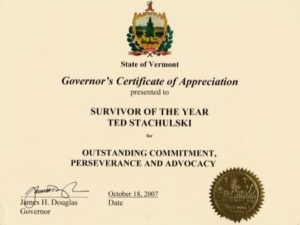You Might Be Tough, But Your Brain Isn’t!
People feel the risk of injury outweighs the gain of winning a starting position on a team, a game or even a championship. Well, that’s not true when it comes to your brain and it’s great to see many athletes are finally speaking out about their falls from grace because of concussions.
Athletes, parents, and coaches need to realize that brains are needed for other important things throughout a person’s lifetime. That there are short term and long term consequences as a result of repeatedly bashing a brain into the jagged interior of a skull or forcing it to shear while the body dishes out and receives punishing blows over and over and over again during practices and games.
Along the way, many players lose themselves like I did. They can’t stand the person they’ve become and some resort to committing suicide. It wasn’t easy finding hope and I had to dig deeper than I ever had to before in my lifetime to find it. I just had to hold on for dear life not knowing what was to come next.
Over the next 18 months, I took on a full schedule of classes during the day and some at night just to have enough credits to be able to graduate in 1988. During that time I developed meaningful relationships with others that didn’t solely revolve around sports. I became one of the first high school Peer Outreach Counselors in the State of New Hampshire and told my story to children in elementary schools. I went to the prom and had a great time.
In June of 1988, I received my high school diploma while I was attending Marine Corps boot camp. During my military career, I was meritoriously promoted and honorably served our country. I got married, raised a family and had meaningful employment as an Electronics Technician and a CDL Driver.
I created the Veterans Traumatic Brain Injury Survival Guide in 2006 to help educate Veterans, their family members, VA medical staff, veteran service organizations, nonprofit organizations and several federal and state agencies about concussions and traumatic brain injuries. In 2007, I received the State of Vermont Traumatic Brain Injury Survivor of the Year Award for outstanding commitment, perseverance, and advocacy.
I’m 46 years old now and according to my neurologist at a Veterans Affairs Polytrauma / TBI Clinic, I suffer every day with “severe post-concussion syndrome (or worse)” from the cumulative effects of those 13 concussions and a few others I had received in my 20’s and 30’s. I’ve spent over a decade in rehabilitation for vision, hearing, balance, speech, swallowing, muscle spasms and other damage to my brain.
I continue to advocate for Veterans with Traumatic Brain Injuries so they too can live long and meaningful lives. I’ve provided a lot of suicide prevention and saved a lot of Veterans lives by drawing upon my personal experience from 1985 through 1988. Those Veterans have gone on to help other Veterans break the STIGMA and get help for their INVISIBLE injuries.
Like Veterans, brain-injured athletes need a safe and supportive way of getting the help they need to heal and return to play or end their careers if they choose to do so. A healthy and honorable alternative to the old way of having stigma and peer pressure force them to play hurt, end their careers alone in shame or commit suicide.
I’m a member of the Krempels Center, a nonprofit organization located in Portsmouth, New Hampshire, dedicated to improving the lives of people living with brain injury from trauma, tumor or stroke. In partnership with universities and community volunteers, they offer programs that engage members in meaningful and productive experiences and provide ongoing support and resources to survivors and their families. The staff and other members participate in a group called “Man Cave” where we talk about men’s issues and what it really means to be a man. I thank each and every one of them for giving me the inspiration to write this article which I’ve wanted and needed to write for such a long time.
After receiving a traumatic brain injury in 2001, I developed Post Trauma Vision Syndrome and Auditory Processing Disorder. My brain was overstimulated by visual and auditory inputs and it prevented me from doing many daily activities which people take for granted like going to the grocery store, sporting events and my children’s concerts.
In 2014, my neurologist, Dr. James Whitlock, gave me a referral to a vision specialist, Dr. Kevin Chauvette at Merrimack Vision Care in New Hampshire. After 40 sessions of vision therapy, I was once again able to see in 3d and listen to music as loud as I wanted. It was amazing being able to make it past the 2nd aisle of the grocery store and attend all of my children’s school and sporting events!
I heard the song “In the Dark” by Billy Squier on the radio and found it easy to put my concussion legacy to the words. I contacted Billy Squier and asked him for permission to use his song lyrics along with my commentary to raise awareness about sports concussions. I’m very grateful to him for giving me permission to do so. I hope our words together will educate people about the dangers of not disclosing and seeking help for sports concussions. I hope our words can help athletes out of a bad situation if they are currently in one like I was 30 years ago.
You can read his song with my adaption by clicking below.
IN THE DARK – SPORTS CONCUSSIONS
(reprinted with permission by Billy Squier and Alfred Music)
This article was published, in its entirety, by the Good Men Project. Reprinted with permission.




